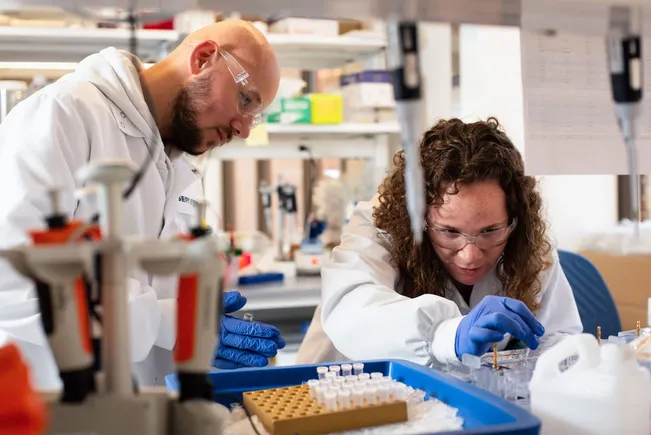Duchenne approval exposes FDA rift over Sarepta gene therapy


Peter Marks is again at the center of a controversial Food and Drug Administration decision on a gene therapy for Duchenne muscular dystrophy. Twice now, the high-ranking FDA leader has pushed aside objections from agency reviewers to grant an approval to Sarepta Therapeutics’ treatment for the muscle-wasting condition.
On Thursday, the FDA substantially broadened use of that treatment, called Elevidys. The decision makes Elevidys available to approximately 80% of people in the U.S. with Duchenne, which has limited treatment options and no cure. The agency also converted Elevidys’ accelerated approval to full, securing its place on the market. Previously, Elevidys was only approved for a specific group of boys 4 or 5 years of age.
“Families facing Duchenne have an urgent need for treatments that will delay the progression of the disease and this represents a significant treatment option for many boys and young men with Duchenne,” said Debra Miller, CEO of the patient advocacy group CureDuchenne, in an emailed statement.
But documents published by the FDA expose a rift within the agency over Elevidys. Three FDA review teams and two top officials recommended Sarepta’s application be rejected due to insufficient and conflicting clinical data. They were overruled by Marks, head of the FDA center that reviews gene therapies, who found the results supportive enough to broaden Elevidys’ label. It’s now cleared for Duchenne patients over the age of 4 with mutations to a specific gene, regardless of whether they can still walk.
“I come to a different conclusion regarding the overall interpretation of the data,” Marks wrote in a memo.
Marks has been a pivotal voice in the review of Elevidys. Before the regulator cleared it last year, he pushed the FDA to schedule an advisory meeting after learning agency scientists leaned towards rejecting the treatment outright, according to reporting by Stat. He then later overruled FDA reviewers in granting an accelerated approval.
Marks made those decisions while on a public campaign to communicate the agency’s flexibility in evaluating gene therapies for deadly diseases like Duchenne. Marks recently spoke at multiple meetings held by patient advocacy groups, noting how the FDA’s thinking has changed to become more patient focused. The regulator aims to speed development of rare disease gene therapies, he said, and views accelerated approvals as a valuable tool to accomplish that goal.
Even so, FDA reviewers once again wanted to reject Sarepta’s application. Elevidys has twice missed the main goals of placebo-controlled trials, failing to meaningfully improve motor function compared to a placebo after one year. Agency staff remain skeptical of the connection between the muscle-protecting, “microdystrophin” protein Elevidys produces and treatment benefit, documents show. They additionally found Sarepta’s main supportive evidence — a series of apparent benefits across secondary measures like how quickly a person can stand up — inconclusive.
Lola Fashoyin-Aje, director of clinical evaluation within the FDA’s gene therapy office, described those findings in another memo as “exploratory,” “possibly due to chance” and argued they should only be considered “hypothesis generating.”
“In some cases, the results of these analyses have yielded conflicting results, further illustrating the unreliability of exploratory analyses to support regulatory decision-making,” Fashoyin-Aje wrote. She added that, if an association between microdystrophin expression and improvement in physical function exists, “the data provided to date do not demonstrate it.”
Fashoyin-Aje made her case in support of the FDA’s clinical, clinical pharmacology and statistical review teams, which all determined that the evidence Sarepta generated doesn’t prove Elevidys effective or support broadening its use.
Notably, they rejected Sarepta’s arguments that Elevidys’ benefits on secondary measures in its main trial make up for the fact its primary outcome was negative. Because that primary statistical test failed, the secondary findings are “misleading” and “cannot guide any stakeholders — including patients, family members and caregivers, and prescribers — in making informed decisions” about Elevidys’ potential benefits, wrote clinical reviewers Mike Singer and Xiaofei Wang.
“We cannot reliably distinguish if these results are due to actual effects of Elevidys, or to chance alone,” they wrote.
Marks took an opposite view, finding Sarepta’s secondary study findings “compelling.” He also argued that historical data suggests even a small benefit compared to a placebo in someone with Duchenne is “clinically meaningful.”
Making Elevidys widely available now, rather than waiting years for a superior product to emerge, could positively impact lives, he added.
“During this time, the availability of this gene therapy option may help slow or prevent irreversible decline that might otherwise occur in both ambulatory and non-ambulatory individuals, particularly since the latter have few or no alternative treatments available to address their imminent further decline in function over time,” Marks wrote.
In making that judgment, Marks is reprising the role of another longtime FDA official, Janet Woodcock. Eight years ago, Woodcock overruled agency reviewers to grant accelerated approval to Exondys 51, a drug also developed by Sarepta, because it was “reasonably likely” to help some people with Duchenne. Her decision was supported by Robert Califf, the FDA commissioner then and now.
Woodcock’s call was similarly divisive within the FDA and led multiple reviewers to depart afterwards. Some accused Woodcock of skirting agency norms and having unusually close ties with Sarepta and with patient advocacy groups, whose influence over drug regulation has grown.
Marks’ decision to broaden Elevidys’ approval could also reverberate.
“The lasting impact of the approval will likely shape the FDA and gene therapy space for some time,” wrote Tim Lugo, an analyst at the investment bank William Blair, in an investor note Thursday. “We believe a more patient focused and less adversarial FDA review process is likely to continue across several areas in the agency, especially for heterogenous and deadly diseases with few good treatment options.”
This post has been syndicated from a third-party source. View the original article here.




